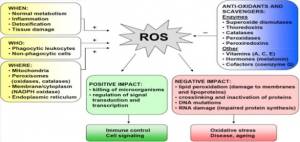Reactive Oxygen Species and Oxidative Stress
Oxidative stress starts with free radicals which are created as normal byproducts of cell metabolism. Reactive oxygen and nitrogen species (RONS) are produced by several endogenous and exogenous processes, and their negative effects are neutralized by antioxidant defenses. Oxidative stress occurs from the imbalance between RONS production and these antioxidant defenses.
Reactive oxygen species (ROS) serve as cell signaling molecules for normal biologic processes which include the superoxide anion, hydrogen peroxide, hydroxyl radical, and single oxygen. Reactive oxygen species (ROS) regulate cellular homeostasis and act as prime modulators of cellular dysfunction contributing to disease pathophysiology.
 Fig 1: Overview of ROS and Oxidative Stress(Picture Source: https://www.slideshare.net/DilveenOmer/oxidative-stress-141808423)
Fig 1: Overview of ROS and Oxidative Stress(Picture Source: https://www.slideshare.net/DilveenOmer/oxidative-stress-141808423)
Through years of efforts, Abbkine has developed a series of assay kits to study cell metabolism. According to the detection index, currently Abbkine cell metabolism detection assay kits can be divided into several different series as below:
- Oxidative stress series(oxidant and antioxidant series, glutathione series, anti-stress series)
- Coenzyme&coenzyme factors series(coenzymeⅠ/Ⅱ series)
- Energy metabolism series(ATP series, mitochondrial respiratory chain series),
- Carbohydrates metabolism series(glycolysis series, tricarboxylic acid cycle series, carbohydrate metabolism series, amylum metabolism series)
- Lipid metabolism series(fatty acid metabolism series, esterase metabolism series)
- Nitrogen metabolism series(amino acid metabolism series)
- Ion metabolism series
Typical product: CheKine™ Reactive Oxygen Species (ROS) Detection Assay Kit (Fluorometric)
a. Basic Product Information
| Item# | Size&Price | Warranty Period | Storage Temperature | Lead time |
| KTB1910 | $59/50T, $79/100T | 12 months | -20°C | In Stock |
b. Assay Mechanism
ROS detection is based on the fluorescent probe DCFH-DA . This probe could be hydrolyzed into DCFH by esterase in the cell while passing through the living cell membrane. DCFH is no fluorescence and cannot transmit the cell membrane, which then can be could be oxidated by ROS and produce the fluorescent DCF. Then the fluorescent could be detect by flow cytometry or fluorescence microscopy , and according which the level of cellular reactive oxygen species can be analyzed.
c. Kit Component
DCFH-DA (10 mM)
d. Features and Benefits
- Provides a simple, sensitive, rapid ROS detection method.
- Based on the fluorescent probe DCFH-DA .
- Suitable for flow cytometry or fluorescence microscopy.
- Provides detailed sample preparation and results calculation methods.
Reactive Oxygen Species and Oxidative Stress Related Product
| Product Name | CAT# | Size |
| CheKine™ Protein Carbonyl Colorimetric Assay Kit | KTB1200 | 48T/96T |
| CheKine™ Superoxide Anion Colorimetric Assay Kit | KTB1210 | 48T/96T |
| CheKine™ Diamine Oxidase (DAO) Activity Colorimetric Assay Kit | KTB1220 | 48T/96T |
| CheKine™ Nitric Oxide (NO) Assay Kit | KTB1400 | 48T/96T/192T |

Inspire your cell and protein
Abbkine focuses on the fields of proteinology and cytology, and is committed to the innovation and research and development of various antibodies, proteins, analytical reagents and kits, in order to become a key promoter in the development of life science research, drug development and other fields. We provide you with the favorite products of protein and immune research users, from basic immunological products, such as protein extraction and quantification, to internal reference label antibodies, primary antibodies and secondary antibodies for immunological experiments; the favorite products of cell research users, from Dyes and kits for detecting cell status, organelle extraction kits, cell substructure staining and tracking and cell metabolism detection products, to cytokine and protein detection kits for cell culture, just to help your research career !











